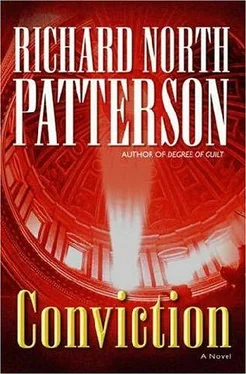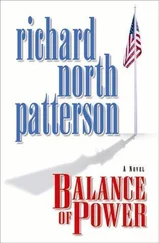Richard Patterson - Conviction
Здесь есть возможность читать онлайн «Richard Patterson - Conviction» весь текст электронной книги совершенно бесплатно (целиком полную версию без сокращений). В некоторых случаях можно слушать аудио, скачать через торрент в формате fb2 и присутствует краткое содержание. Жанр: Старинная литература, на английском языке. Описание произведения, (предисловие) а так же отзывы посетителей доступны на портале библиотеки ЛибКат.
- Название:Conviction
- Автор:
- Жанр:
- Год:неизвестен
- ISBN:нет данных
- Рейтинг книги:3 / 5. Голосов: 1
-
Избранное:Добавить в избранное
- Отзывы:
-
Ваша оценка:
- 60
- 1
- 2
- 3
- 4
- 5
Conviction: краткое содержание, описание и аннотация
Предлагаем к чтению аннотацию, описание, краткое содержание или предисловие (зависит от того, что написал сам автор книги «Conviction»). Если вы не нашли необходимую информацию о книге — напишите в комментариях, мы постараемся отыскать её.
Conviction — читать онлайн бесплатно полную книгу (весь текст) целиком
Ниже представлен текст книги, разбитый по страницам. Система сохранения места последней прочитанной страницы, позволяет с удобством читать онлайн бесплатно книгу «Conviction», без необходимости каждый раз заново искать на чём Вы остановились. Поставьте закладку, и сможете в любой момент перейти на страницу, на которой закончили чтение.
Интервал:
Закладка:
"Or," Terri interjected pointedly, "whether his lawyer had a coke habit?"
The inquiry, cutting off Finney's clipped, ironic narrative, induced a look of doubt and surprise. "Why do you think that?"
"Just surmise. You interview the grandmother?"
"I didn't." The hint of doubt in Finney's manner became defensiveness. "A junior associate did, I think. There was a lot to do, and so a lot of us worked this case."
Carlo could read in Terri's skepticism her imaginings of some rookie lawyer, too lightly supervised, interviewing an elderly woman from the Bayview across the gap of race and age and culture—though Carlo himself had adduced from Eula Price the telling detail of James's runny nose. But then his life until age seven had given him a preternatural sense of people, and what was left unsaid.
"Who was the partner in charge?" Terri asked.
"Which year?" Finney's tone retrieved its irony. "The direct appeal took seven years by itself, and the habeas corpus petition—the first time we could present facts outside the record—was decided seven years after that. About halfway through, the first partner, Frank Goldmark, died of a massive coronary at a 49ers game. The next one, Leslie Keller, left to become General Counsel of an Internet start-up in return for stock options which became worthless once the company crashed and burned. I guess you could say Rennell Price was a real killer."
Terri did not smile. "After Keller left," she asked, "who took over the case?"
Finney glanced at her daughter. In a corner of the living room, the child watched a purple puppet chirp at her from the television. Turning, Finney answered, "I did. After all those years, the case was too attenuated to explain to another partner, and would have required too much learning the law for him to get a grip on. After all," she added sardonically, "we were doing this for free."
This time Terri's expression was so polite that only Carlo might read it as a mask. "I guess that's why they call it pro bono," she answered, and the baby in the playpen began to whimper.
* * *
They waited in the living room while Finney took twenty minutes to breast-feed her son. "What's wrong?" Carlo asked.
Terri looked at him in surprise. Softly, she answered, "To me, it's classic—the intellectual severity, the unearned cynicism, the ability to see every irony but how badly they served Rennell. Sometimes I'm not sure what makes me crazier—smug big-firm lawyers, or privileged white women."
Carlo looked at the plastic kids' toys scattered across the carpet. "This is privilege?"
"To a mother." Terri's smile was sour. "She's home, isn't she? Rennell Price is about to die."
* * *
When Finney returned without the baby, she began speaking as if she'd never left. "The problem with the direct appeal was that the record was so clear.
"Mauriani played it straight. No racial bias in jury selection. No withholding of exculpatory evidence. If his witnesses gave answers which were objectionable and James failed to object, Mauriani would caution them and then rephrase the questions . . ."
"Why not?" Terri observed mildly. "When you're getting away with murder, why not wrap it with a bow?"
"The point is," Finney retorted, "that all the record left us was to argue that, on its face, James was so incompetent as to effectively deny Rennell Price his right to counsel. The Attorney General's Office argued that there might be strategic reasons for even his worst lapses. Though no one could guess what they were . . ."
"What did James tell you?" Carlo asked.
"Nothing," Finney responded in an arid tone. "He was in the middle of disbarment proceedings, so his lawyer advised him not to meet with us." She glanced at Terri. "All he told me on the phone was that Rennell's case was so hopeless that nothing he did, or didn't do, would have made any difference. Lest that sound too self-serving, the California Supreme Court read the record, and agreed." Pausing, she smiled thinly. "For that meager result, we bought Rennell Price seven more years on death row. Clever lawyering, don't you think?"
* * *
Turning from the screen, the little girl pronounced herself hungry. A look of martyred patience crossed Finney's face, and she invited Terri and Carlo to the kitchen while she made a peanut butter sandwich and cut it into bite-size squares. Placing this offering before her daughter, she said with a faint smile, "Here you are, sweetie. Quicker than you can say 'paternity leave.' "
The little girl looked up at her, uncomprehending, then slipped the first brown and white square into her mouth. "Not that I blame my husband," Finney remarked. "Our firm's got upward of three hundred male lawyers, and not one has taken the six-month leave we offer. Its mere existence is enough to make them paragons of feminism."
The bitterness beneath this observation made Carlo imagine a disenchanted and, perhaps, no longer quite attentive lawyer left by attrition to deal with a hopeless client.
"At least that's something," Terri answered. "My first husband was just a deadbeat." But, of course, Ricardo Arias had been so much more than that.
* * *
As they went back to the living room, Terri turned to Carlo. "Once Rennell lost his direct appeal," she explained, "the next step was habeas corpus. Basically, you claim that a prisoner is being imprisoned in violation of his constitutional rights, and then try to get him out by proving it.
"In Rennell's case, that enabled Kenyon and Walker to file a separate petition, also before the California Supreme Court, presenting evidence outside the record—maybe of innocence, or factors which might cut against a death sentence. As well as why James might have failed to uncover evidence of either." Of Finney, she inquired, "Who looked into Rennell's school or medical records?"
Finney settled back in her chair. "That part got assigned to another associate, I can't remember who. What comes to me is a lot of truancy, and a couple of accidents—things like falls and broken bones."
Terri studied her. "Kid stuff?" she asked softly.
"I guess so, yeah."
Carlo glanced at Terri. "What about Rennell's IQ?" he asked.
"I remember he was no genius," Finney said reluctantly. "But if you're talking about retardation, that became more critical after I left the firm. By the time the Atkins case came down, it was too late for us to use it—our habeas corpus petition had already been shot down by the State Supreme Court, the Federal District Court, and the Ninth Circuit Court of Appeals, and the U.S. Supremes had declined to review. So raising retardation falls to you."
No problem, Carlo thought. We've got seven weeks. It struck him that Terri's face was never more arresting than when her green-flecked brown eyes betrayed the swiftness of her thoughts. "Did you try to interview Rennell's teachers?" she asked.
"I think so. But I don't recall anything coming of it."
"What about the family?"
"Not much there. Mom killed Dad, Grandmother's literally sick and tired, and his brother, Payton, hasn't opened his mouth for a decade and a half. All we got from any of them was the grandma saying that the Rennell who came to live with her was a sweet and gentle boy. I guess that's what she had to cling to."
Terri's features suddenly lacked all expression—a sign, Carlo guessed, of how hard she was working to conceal her impatience with Laura Finney. "What about the mother?" she asked.
"We tried," Finney answered. "But the woman's crazy. Talking to her was like listening to some street person jabber to herself."
"No doubt," Terri responded. "But tell me about it, anyway."
* * *
What Laura Finney remembered was eyes like burn holes.
She sat with Athalie Price in a mental institution so grim that it could have been nothing else. The woman's processed hair was hacked off, her face gaunt, her body as stringy as beef jerky. But it was the eyes—to Finney, they spat madness.
Читать дальшеИнтервал:
Закладка:
Похожие книги на «Conviction»
Представляем Вашему вниманию похожие книги на «Conviction» списком для выбора. Мы отобрали схожую по названию и смыслу литературу в надежде предоставить читателям больше вариантов отыскать новые, интересные, ещё непрочитанные произведения.
Обсуждение, отзывы о книге «Conviction» и просто собственные мнения читателей. Оставьте ваши комментарии, напишите, что Вы думаете о произведении, его смысле или главных героях. Укажите что конкретно понравилось, а что нет, и почему Вы так считаете.












